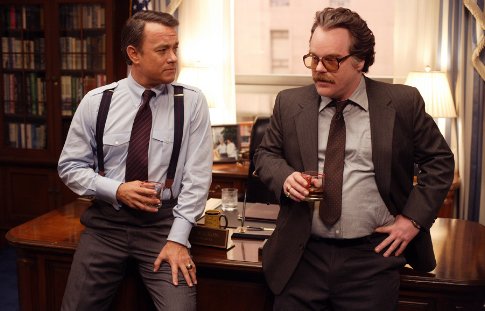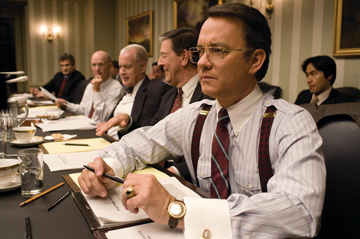“‘There is no doctor who can heal me.But I know that a man like Pol Pot, he is even sicker than I am. He is crazy in the head, because he believed in killing people. He believed in starving children. We both have the horror in our heads.” Dith Pran, 1942-2008.
Category: Asia
From Russia with Love.
Speaking of bravura performances recently, my sister Gill (on loan from ABT) premiered as Odette/Odile in the Kirov Ballet’s production of Swan Lake over the weekend in St. Petersburg, at the famed Mariinsky Theater. And, through the magic of Youtube, her Black Swan pas de deux is now online:
For the non-ballet folk, that spin move is known as a fouette, and they’re hard!
Trouble in Tibet.
“The protests, sparked by the anniversary of the failed 1959 uprising that sent Tibet’s Dalai Lama into exile, are the latest embarrassment to hit 2008 Olympic-host China.” Some deadly (and potentially Olympics-threatening) violence breaks out in Lhasa, Tibet, claiming between 10 and 100 lives (depending on the source.) “Chinese authorities blamed the Dalai Lama for the unrest, but the Dalai Lama said the protesters were simply acting out of ‘deep-rooted resentment’ of the Chinese government. ‘As I have always said, unity and stability under brute force is at best a temporary solution…I therefore appeal to the Chinese leadership to stop using force and address the long-simmering resentment of the Tibetan people through dialogue with the Tibetan people. I also urge my fellow Tibetans not to resort to violence.’“
Reporting from China, the Atlantic‘s James Fallows says the news isn’t really getting past the Great Firewall…yet.
The Great Firewall, block by DNS block.
“Depending on how you look at it, the Chinese government’s attempt to rein in the Internet is crude and slapdash or ingenious and well crafted. When American technologists write about the control system, they tend to emphasize its limits. When Chinese citizens discuss it — at least with me — they tend to emphasize its strength. All of them are right, which makes the government’s approach to the Internet a nice proxy for its larger attempt to control people’s daily lives.“
Forget Ohio and Texas, Sen. Clinton…Want to see a “real” firewall in use? The Atlantic‘s James Fallows explains the nature and workings of China’s “Great Firewall.” “What the government cares about is making the quest for information just enough of a nuisance that people generally won’t bother…When this much is available inside the Great Firewall, why go to the expense and bother, or incur the possible risk, of trying to look outside? All the technology employed by the Golden Shield, all the marvelous mirrors that help build the Great Firewall—these and other modern achievements matter mainly for an old-fashioned and pre-technological reason. By making the search for external information a nuisance, they drive Chinese people back to an environment in which familiar tools of social control come into play.”
Ex-Pats United.
It’s not just here at home. Sen. Obama takes the Americans Abroad primary 2-1 (65%-32%), winning most of the countries around the world (Ex-pats in Israel and the Philippines opted for Clinton.) Thanks, Kris, and all the other Obama voters out there across the seas. Update: Clinton did well in the DR as well.
1.4 Trillion, and Rising.
“Today’s American system values upheaval; it’s been a while since we’ve seen too much of it. But Americans who lived through the Depression knew the pain real disruption can bring. Today’s Chinese, looking back on their country’s last century, know, too. With a lack of tragic imagination, Americans have drifted into an arrangement that is comfortable while it lasts, and could last for a while more. But not much longer.” The Atlantic‘s James Fallows examines the unstable financial codependence between China and the United States, and how it could all too easily unravel. “Lawrence Summers calls today’s arrangement ‘the balance of financial terror,’ and says that it is flawed in the same way that the ‘mutually assured destruction’ of the Cold War era was…With allowances for hyperbole, something similar applies to the dollar standoff. China can’t afford to stop feeding dollars to Americans, because China’s own dollar holdings would be devastated if it did. As long as that logic holds, the system works. As soon as it doesn’t, we have a big problem.” Update: Make that 1.53 trillion.
Mr. Wilson Goes to Washington.

At one point in Mike Nichols’ smart, surprisingly enjoyable Charlie Wilson’s War, the freewheeling, fun-loving Representative Charles Wilson (Tom Hanks), he of the Texas 2nd Congressional District, tells his schlubby, foul-mouthed partner at the CIA, Gust Avrakotos (Philip Seymour Hoffman), “You ain’t James Bond.” Deadpans Avrakotos, “You ain’t Thomas Jefferson, so let’s call it even.” True, Bond and Jefferson they’re not, but that’s actually part of the appeal of Nichols’ lively little film. A strangely optimistic, almost Capraesque movie about the covert proxy war in Afghanistan (and, ultimately, the inadvertent role played by the U.S. in fostering the Taliban), Charlie Wilson’s War — adapted by The West Wing‘s Aaron Sorkin from the book by the late George Crile — is no grim, sober-minded edutainment. Moving at a brisk clip and maintaining a light touch — too light, some might argue — throughout, the movie instead depicts how a few (relatively) ordinary, committed people can change the world…provided one of them is sitting on the House Defense Subcommittee, and has stacked up a sizable amount of chits.
When — after a quick flash-forward setup — we first meet Congressman Charlie Wilson (Tom Hanks, eschewing the Pvt. Ryan earnestness for his more sardonic Bachelor Party/Volunteers side), he’s lounging in a Vegas hot tub with a coke-snorting television producer, a Playboy bunny, and two strippers. In short, he seems like a out-and-out cad. But there’s something endearing and even statesmanlike about his piqued interest in a 60 Minutes report, playing in the corner, on the mujahideen in Afghanistan. (Maybe it’s the Dan Rather Texas connection.) Delving further into the issue back in Washington, Wilson — exercising the power of his crucial committee position — singlehandedly doubles U.S. funding of the mujahideen from $5 million to $10 million. This by-all-accounts token gesture draws the attention of the wealthy Houston socialite Joanne Herring (Julia Roberts, solid), a woman with money, connections, and a fervent commitment to anticommunism, and she sends Wilson off to Pakistan to meet with President Zia-ul-Haq about the situation in neighboring Afghanistan. There, Wilson is moved to the cause by the sight of a dismal refugee camp, and soon enough, he’s enlisted an important ally in Avrakotos, a profane Langley veteran (Hoffman, showing yet another side after Before the Devil and The Savages this year, and nearly running away with the movie.) Together, these three — Wilson, Herring, Avrakotos (John Rambo’s unique contributions to the cause of Afghan freedom are sadly overlooked — set in motion a scheme not only to increase funding radically for the war but to funnel Soviet weaponry owned by Israel and Egypt to the freedom fighters there. Of course, some delicate diplomacy is required, and, in any case, giving Afghan youths an arsenal of helicopter-slaying RPGs doesn’t seem like such a great an idea in retrospect…
While nodding to the dismal events that follow American intervention in the region, Charlie Wilson’s War hardly dwells on the blowback, or on anything — a few refugee camp horror stories and a Pavel Lychnikoff cameo notwithstanding — that might interrupt its tone of hearty, back-slapping jocularity. (Supporting turns by Amy Adams, Emily Blunt, Ned Beatty, Denis O’Hare, John Slattery, and Peter Gerety help speed things along in a comfortable groove.) And yet, however feel-good, Wilson ultimately feels more ripped from the headlines than even the filmmakers could’ve guessed. Some lawmakers have trouble distinguishing between Pakistan and Afghanistan at one point, and Herring begins an introduction of Pakistan’s President by saying, “Zia did not kill Bhutto.” (Leavening the chill that follows this now-eerie moment, Rudy Giuliani and John Murtha also come up at various times as punchlines.)
But, its timeliness and prescience aside, what I found most impressive about Charlie Wilson’s War is how aptly it portrays the feel of Washington. This was somewhat surprising to me as, while I liked Sorkin’s The West Wing decently enough as a TV drama and admired its general idealism about politics, the show always felt rather fake to me. But, be it due to Crile or Sorkin or Nichols, Wilson conveys a lot of the telling details of life inside the Beltway quite well — the hallway horse-trading and neverending quid pro quos, the simultaneous meetings, the bland, institutional cafeterias; the bevy of youngish staffers (and inordinately pretty administrative assistants) on Capitol Hill, the deals crafted over dinner or drinks, the conference calls, the memory holes, myopic thinking, and CYA behavior. Outside of The Wire‘s nuanced take on the compromises of Baltimore city politics, it’s hard to think of a more on-target recent portrayal of the (non-campaigning) political process. Sadly, for Congressman Wilson as for today’s legislators, fiddling with the internal dynamics of far-flung nations we barely understand for short-term gain is All in the Game. Still, as Charlie Wilson’s War proves, don’t let it ever be said that nothing gets done in Washington.

A Death in Pakistan.
Benazir Bhutto, 1953-2007. It seems all too many christmases of late has been marked by grim news on the global front, from the devastating tsunami to the botched Saddam execution. This year, obviously, it was the assassination of the former prime minister who, while no angel, nevertheless embodied for many hopes for a stable, democratic Pakistan. Her murder — in the military stronghold of Rawalpindi, no less — further destabilizes a nuclear-armed nation already teetering on the brink, and roils significantly the Dubya administration’s fatally flawed approach to the country. Let’s just hope Bhutto isn’t remembered as the next Franz Ferdinand.
The Pope and “Lyndon B. Magellan.”
“Some 40 years later, it is a Christmastime story, of the war that raged on and of a long-shot airborne peace mission that became the first round-the-world flight of a U.S. president.” The WP‘s Sid Davis tells the story of LBJ’s attempt in 1967 to forge a Christmas peace (not to be confused with Nixon’s 1972 Christmas Bombings.) “To Johnson, weary of war, his health torn by the human cost, attempting a dramatic, attention-grabbing, globe-circling appeal to the pope at Christmas was worth the chance. Undaunted by criticism of his ‘flying circus,’ his “global extravaganza,’ Johnson defended his effort. ‘No man,’ he said, ‘can avoid being moved to try harder for peace at Christmastime.'”
The Hoover Raids.
“In order to make effective these apprehensions, the proclamation suspends the Writ of Habeas Corpus for apprehensions made pursuant to it.” Taking a page from his earlier mentor, A. Mitchell Palmer, FBI Director J. Edgar Hoover, recently declassified documents reveal, floated the idea of interning 12,000 Americans he suspected of disloyalty in 1950, during the Korean War. [Hoover’s letter.] “Hoover wanted President Harry S. Truman to proclaim the mass arrests necessary to ‘protect the country against treason, espionage and sabotage.’ The F.B.I would ‘apprehend all individuals potentially dangerous’ to national security, Hoover’s proposal said.” Thank goodness our intelligence community is past such retrograde thinking and kneejerk trampling on civil liberties today…uh, right?
